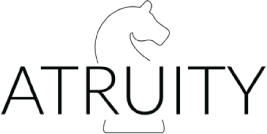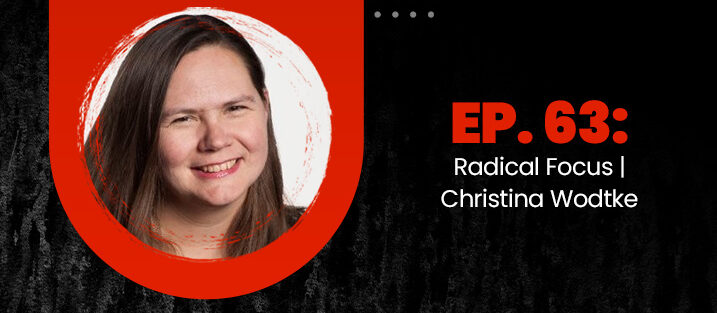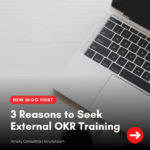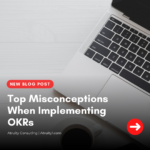OKRs Q&A Podcast Ep. 63: Radical Focus | Christina Wodtke (Encore Presentation)
This week on the OKRs Q&A Podcast, we are rereleasing an incredible episode with a major industry thought leader and the author of Radical Focus & Radical Focus 2.0 – Christina Wodtke. Tim and Christina discuss the simplicity of OKRs, how to launch a pilot program that works and where to begin with an OKR implementation. Tim and Christina do a deep dive into some of the most complex OKR issues in the world today.
An established thought leader in Silicon Valley, Christina is a “curious human” with a serious resume. Her past work includes re-design and initial product offerings with LinkedIn, MySpace, Zynga, Yahoo! and others, as well as founding three startups, an online design magazine called Boxes and Arrows, and co-founding the Information Architecture Institute. She is currently a Lecturer at Stanford in the HCI group in the Computer Science department. Christina teaches worldwide on the intersection of human innovation and high-performing teams. She uses the power of story to connect with audiences and readers through speaking and her Amazon category-bestselling books.
Christina’s work is personable, insightful, knowledgeable, and engaging. Her books include Information Architecture: Blueprints for the Web, Pencil Me In, and The Team that Managed Itself. Her bestselling book is a business fable called Radical Focus, which tackles the OKR movement through the powerful story of Hanna and Jack’s struggling tea startup. When the two receive an ultimatum from their only investor, they must learn how to employ OKRs and radical focus to get the right things done.
To connect with Christina or to get more information on how to become a whole-mind, high performing team, visit http://cwodtke.com/ or Eleganthack. To purchase Radical Focus – https://www.amazon.com/Radical-Focus-Achieving-Important-Objectives-ebook/dp/B01BFKJA0Y
If you are interested in working with the Atruity team or have a question you would like addressed on the show, please email contact@atruity1.com or visit our website at www.atruity1.com
This episode originally aired in March, 2021
Tim:
Well, Christina, welcome to the program, please, for our audience sake, tell us a little bit about yourself and what do you do.
Christina Wodtk…:
Well, thank you so much, Tim, for having me on your podcast. I really appreciate it. I’m honored. So my name’s Christina Wodtke. I was in industry for a long time. And then about six years ago, I moved into academia and I’m currently a lecturer in the HCI Department of Computer Science at Stanford University. Human computer interaction is exactly what it sounds like. We try to make the computers nice to people which I’m beginning to think we could use a lot more of.
Tim:
Sure. So how did you become involved with OKRs?
Christina Wodtk…:
It’s a strange thing. I was working at Zynga as a general manager and we used OKRs, because Zynga was a [inaudible 00:01:01] company. And then I quit. I was really tired. I was really burned off. I took some time to rest. I spent a lot of time watching food TV and traveling occasionally. And then I knew I had to get back to work, but I didn’t want to do it the same way. So I thought, “I know OKRs, maybe I’ll set an objective for myself.” And I’ve been doing OKRs now for six or seven years, personal ones.
Tim:
Terrific.
Christina Wodtk…:
Just as a guide for my own career. But then when I started working for some folks, I was like, “I don’t know what I’m going to do. Let’s try a few things. I’m going to work for the startup.” They were a mess. They were all over the place. They would jump after any interesting thing that showed up. And I thought, “Okay, this would be a good place for OKRs.” And so I introduced him to the idea, we started using them, it helped. And then I helped a couple more companies with it. And over time the system just got smoother and better and stronger. And I thought, “Well, maybe other people could use this. Maybe I’ll write a book.” And so it did.
Tim:
Well, your book, to me, I think it’s so simple. This is about understanding concepts and your book Radical Focus, I think when I introduce people to it, it’s an easy read. It’s something they can relate to and they always come away with the same statement, which is, “Gosh, I really understand OKRs a heck of a lot better.” So a huge fan of your book.
Christina Wodtk…:
Thank you.
Tim:
So well, you’re welcome. So what do you think is the biggest misconception today about OKRs?
Christina Wodtk…:
The biggest is a hard one. There’s some common ones that are really problematic. One is, a lot of people seem to use OKRs as a way of managing people as a performance management. We’re going to tell you, here’s what we want you to hit and you’re going to hit it. And that’s the end of it. And the reality is that OKRs has only really worked for empowered teams as Marty Cagan’s been call calling it lately. Marty and I are lucky enough to live in the same area and we get breakfast here and there.
Tim:
Nice.
Christina Wodtk…:
Oh yes, indeed. And we really have a very similar mindset. So he’s in my book and I’m in his book, Empowered. And the thing is that you can’t use OKRs to control what people do with their time. Or you shouldn’t, it doesn’t make any sense.
The whole point of OKRs is to say, here’s the goal we have. I’ve hired really smart people go figure it out. It helps you scale as upper management a lot. And I think that problem with it has been spread by a couple of different things. We were just talking about this, that some of the earliest software just looked like project management software and somebody stuck the word OKRs on it. Because, OKRs were looking hot. But there’s really not a good tool for measuring actual progress towards a numeric goal. So there’s that problem, first of all.
And then I think there were a bunch of consultants who jumped in early and said, Well, I already teach this, that or the other, I’ll just throw in OKRs. What’s the difference between them and a smart goal? I can do this.” And the reality is, they actually are different than a smart goal. They have a methodology, a way of accomplishing the goals. So I always like to say OKRs are a goal setting and accomplishing framework.
Tim:
Very well said. Absolutely. So in your experience, what are the largest reservations that executives have about implementing OKRs within their organization?
Christina Wodtk…:
Again, there seems to be multiple problems. Letting go is hard.
Tim:
Yes.
Christina Wodtk…:
It’s just really, really hard, especially for entrepreneurs. Because most entrepreneurs have started being a company of one or maybe two people, three people. And so you’re used to doing everything. And then as soon as you hire someone, you have to let go of some of the things that you were in charge of. And it continues on and letting go can be really, really difficult. Because you’re convinced this is my baby, I know what’s best. And then in bigger companies, they all want to know, “Hey. Well, how do I do performance reviews? What happens if people don’t make this goal? What do I do? How do I fire someone?” And moments like that I think, [Ugh 00:05:38], where is the good management training? I was very lucky. At Yahoo I got really great management training. And so I wrote another book which is called the team that managed itself. And it’s like, “Okay, we’ve got OKRs, what else do we need? How do we hire? How do we manage? How do we do the performance reviews?” All the stuff that goes around it to create empowered teams.
Tim:
A hundred percent agree. I’m a big believer in the simplicity of objectives and key results, as you said, giving people the room to be able to think for themselves. And by the way, how did you come up with that management four square? I think it’s brilliant.
Christina Wodtk…:
Thank you. I wish I could take all the credit for it, it was when I was in Zynga. We were reporting on our OKRs to Mark and he said, “This is too confusing. CityVille has a good template. Go find them.” And they had something like the four square, it had a lot more information around, blockage, et cetera, et cetera. And we started using it. And when I rage quit Zynga, I was so exhausted. I was doing a little consulting for some startups and they were just a mess. They were like every shiny object. It’s like, oh, we could do this. And we could apply for this. And we could try that. And I thought, “Well, might as well try on OKRs.” And it worked beautifully. And so as I helped a couple more startups, it got worn smooth a little bit like a stone by the ocean until it was only the most important things. So I think it’s a really good way to start, start as simple as possible. And then when you need something else, when you really are struggling, then you can start messing with it. Yeah. It works well.
Tim:
Yeah. So what do executives really need to know as they begin to start their OKR journey, Christina?
Christina Wodtk…:
Well, don’t do it for the entire company at once. Oh my gosh. I always tell them, start with a pilot. So there’s three different ways to do it. But the one that I’ve seen be most successful is to take a team that’s already high performing and often managers think, “Oh, there’s this tool. Let’s use it on our worst team and see if they get better.” But honestly, the high performing teams, when you’re trying out a tool are much better because they’ll tell you, “This is why it won’t work, this is what I had to change. This is what’s missing.” So have a high performing team, use it for one quarter. And if it’s used well, they’ll become more successful and their numbers will go up. And one thing I’ve learned about being in a big company, whenever the execs say this group is really crushing it, everybody wants to copy what they’re doing.
So then it makes it much easier to add a few more teams to the OKR process. And then a few more until eventually you’ve got everybody in it and it could take up to a year. But the problem is, if you just try to put it on everybody, it’s so chaotic, it looks like busy work, people are confused, it’s a mess. And often the company will even refuse the methodology. I know a company that was really sweet and very egalitarian and they hated OKRs after using it once. And when they tried to do it again, they had to rename it. They called it goals and KPIs or something. Because they had to sneak at OKRs in the past.
Tim:
Right. When I started at Atruity, I did a lot of research on why plans fail. And my in was a huge, huge deal. And achieving that buy-in and starting slowly and getting the hang of is what we actually encourage at Atruity. Because, once you do get the hang of it, people do buy in, they do feel and can sense the level of success that they’re having. They become the biggest advocates as it begins to slowly move throughout the organization.
Christina Wodtk…:
It’s just like when there’s invitation only for clubhouse or back in the day Gmail. Right?
Tim:
Right.
Christina Wodtk…:
If you hear there’s an invitation and you haven’t got one, you sure want one now.
Tim:
Very true. All right. We were talking offline and I wanted to ask you this question. I’m going to ask you this question and it’s, what’s the one burning answer to an OKR question that no one has ever asked you?
Christina Wodtk…:
Absolutely. I think it’s that OKR’s greatest value is actually organizational learning more than anything else. And nobody comes to me and says, “Christina, how can we make our organization learn faster?” Because learning faster is the single best competitive advantage you possibly can have, if everybody in your company can quickly learn what works and what doesn’t work. So if you use OKRs and you’re you meeting every week, and you’re saying, “I tried to do this,” and then at the end of the week, “oops, it didn’t happen because of that,” you can start pulling out patterns. You can start growing this knowledge within your company very quickly. And then the end of quarter, pause, do a real deep reflection. I know it’s hard to lose those two days or three days, depending on how you do it, but it changes everything. Because as I’m an instructor now, reflection is a key part of learning.
When you stop and reflect, you move this knowledge into your long term memory. So it’s there when you need it. And I find that it’s really hard for companies and businesses to think in time. Let me explain that. Time is a medium, like a piece of paper or clay or something. And so when you’re doing these OKRs, you want to think about how am I making my organization smarter across three or six quarters? And so you want to always be saying, “Okay, if we spend this whole quarter working on acquisition, in Q-2 people don’t just forget how to do it.” they’ve spent this entire three months learning how to do it. Now, acquisition is part of your DNA. You spend a whole quarter on conversion, guess what? Now that’s part of your DNA. And so as the company goes on over time, learning has increased, they’ve become smarter, they know what works, what doesn’t work. And that institutional knowledge allows you to compete far more effectively in the marketplace.
Tim:
Wow. That’s really well said. And I think that very successful organizations do get that in one way shape or form. Maybe sometimes you’ve crystallized that thought process, but they do. They learn faster and sometimes through failing, they learn faster as well.
Christina Wodtk…:
Oh yeah.
Tim:
Could agree with you more there. So I’m going to ask one final question and that’s really about insight. Is there anything else that our audience would love to know about the OKR journey that you’ve seen that would give them the ability to be more successful?
Christina Wodtk…:
So very much. So many things have happened. Radical Focus actually came out about five years ago. And I’m doing a second edition now and I have 30,000 more words because so much has been learned. And part of it has to do with strategy. A lot of companies don’t really have much strategy. They’re often sort of reacting towards what’s there, or they’re doing the same thing that they used to do and keep going. And OKRs work really well when you’re trying to shift the company into a new strategy. And that’s reflected by my talk where I talk about Intuit and how Intuit had to make this move from making memory to making chips and get out of the memory business. And that’s a big, big shift and that’s really, really hard. So that’s a place where it can be much more helpful.
I think another one is, not everything can grow forever. We would all love it, but if you put people on a product that’s essentially dying in the marketplace, for whatever reason, those people would come depressed and you’re constantly asking them to do something that they can’t necessarily do. And if you tie their paycheck to that, you’re going to get cheating really badly. For example, you remember VW with their faked tests or Wells Fargo with their signing up people for account they never asked for?
Tim:
Sure.
Christina Wodtk…:
That’s what you get when you set a goal that people just cannot make whatsoever. That’s a huge mistake. People will cheat if their paychecks tied to it. And they’ll cheat if their social standing is tied to it too. I really feel like the metrics have to be created together with both the boss and the people trying to accomplish it.
And I think you have to think about psychological safety before you do this. You need to have a place where an employee feels comfortable enough to say, “I know that’s what you want, but there’s no way we could hit those numbers.” You need to be able to have a conversation. So you can say, “Well, why can’t you hit it?” and bounce ideas back. And sometimes there are some products that just aren’t going to grow. And there are some products that are going to die. And time to do push goals, stretch goals, that’s just going to depress people and then they’re going to quit. And then you have to hire someone. You have to train… Oh my gosh, you don’t want that.
Tim:
No. Christina, thank you. That was wonderful insight. So obviously we’re huge fans of your first book. But tell us a little bit, give us a tidbit about the new book that you’re going to be releasing. Love to hear more about it.
Christina Wodtk…:
Well, the second edition… I think my first was really much more about startups because that’s what I did. Right?
Tim:
Right.
Christina Wodtk…:
And then once the book was out, of course, big companies were like, “Give me some of that OKR magic.” And a lot of things had to be adjusted and changed. And if you hadn’t caught on by that, I tend to work very iteratively. So by working with these bigger companies, we had to talk about things like, what do you do when you have something that’s going to take a very long time? It’s going to take a year and a half, like research, what do you do then? Or how do you cascade when you have five, six levels of management? Well, you don’t cascade. You have to do something else. You have to look for alignment. These are all the questions that people are always coming to me.
What kind of OKR can you set if this is going to take a year but I need milestones? Well, you don’t want to have milestones because those are tasks. So can you use OKRs for that? There’s just been a lot of questions for people who are a lot bigger. More people, longer time, more products, how do all these products fit together? And the classic of course, which I’m sure you hear all the time, Tim, which is well, “Finance doesn’t have OKRs” or “What about the marketing team? They want OKRs too.” And you’re like [“Meh 00:17:03], not really. Not everybody needs it.”
So a lot of that is about how to handle all these different situations. What I loved about the original OKRs is they are simple and hard. Like eat less and exercise more. Right?
Tim:
Right.
Christina Wodtk…:
There’s a simplicity and a clarity there. But the reality is that some companies are in more complex situations and you need an equally simple way to approach strategy. You need equally simple way to approach hiring. And that’s what I’ve been trying to work towards with my colleagues and with my clients. Is to try to help them as they grow. Continue to be the exciting place where eight players want to play and that’s growing, that’s doing something good for the world, all that.
Tim:
Fantastic. Christina, I can’t thank you enough for coming on our program. This was truly delightful for me and I’m sure our audience as well. And I’d like to thank you again for doing so.
Christina Wodtk…:
Oh, well thank you for setting aside this time to talk to me, it’s much appreciated and my favorite topic too.
Tim:
I love it. Well, Christina, thank you so much and have a wonderful day.
Christina Wodtk…:
You too. Bye.












